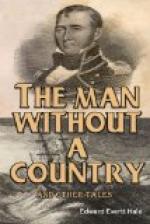“What sent you out from your warm steam-boiler?”
“Steam-boiler, indeed,” said Todd.
“Two rivets loose,—steam-room full
of steam,—police frightened,—neighborhood
in a row,—and we had to put out the fire.
She would have run a week without hurting a fly,—only
a little puff in the street sometimes. But there
we are, Ingham. We shall lose the early mail
as it stands. Seventy-eight tokens to be worked
now.” They always talked largely of their
edition at the Argus. Saw it with many eyes,
perhaps; but this time, I am sure, Todd spoke true.
I caught his idea at once. In younger and more
muscular times, Todd and I had worked the Adams press
by that fly-wheel for full five minutes at a time,
as a test of strength; and in my mind’s eye,
I saw that he was printing his paper at this moment
with relays of grinding stevedores. He said it
was so. “But think of it to-night,”
said he. “It is Christmas eve, and not
an Irishman to be hired, though one paid him ingots.
Not a man can stand the grind ten minutes.”
I knew that very well from old experience, and I thanked
him inwardly for not saying “the demnition grind,”
with Mantihni. “We cannot run the press
half the time,” said he; “and the men we
have are giving out now. We shall lose all our
carrier delivery.” “Todd,” said
I, “is this a night to be talking of ingots,
or hiring, or losing, or gaining? When will you
learn that Love rules the court, the camp, and the
Argus office.” And I wrote on the back
of a letter to Campbell: “Come to the Argus
office, No. 2 Dassett’s Alley, with seven men
not afraid to work”; and I gave it to John and
Sam, bade Howland take the boys to Campbell’s
house,—walked down with Todd to his office,—challenged
him to take five minutes at the wheel, in memory of
old times,—made the tired relays laugh as
they saw us take hold; and then,—when I
had cooled off, and put on my Cardigan,—met
Campbell, with his seven sons of Anak, tumbling down
the stairs, wondering what round of mercy the parson
had found for them this time. I started home,
knowing I should now have my Argus with my coffee.
III.
And so I walked home. Better so, perhaps, after all, than in the lively sleigh, with the tinkling bells.
“It was a calm and silent
night!—
Seven hundred
years and fifty-three
Had Rome been growing up to
might,
And now was queen
of land and sea!
No sound was heard of clashing
wars,—
Peace brooded
o’er the hushed domain;
Apollo, Pallas, Jove, and
Mars
Held undisturbed
their ancient reign
In
the solemn midnight,
Centuries
ago!”




